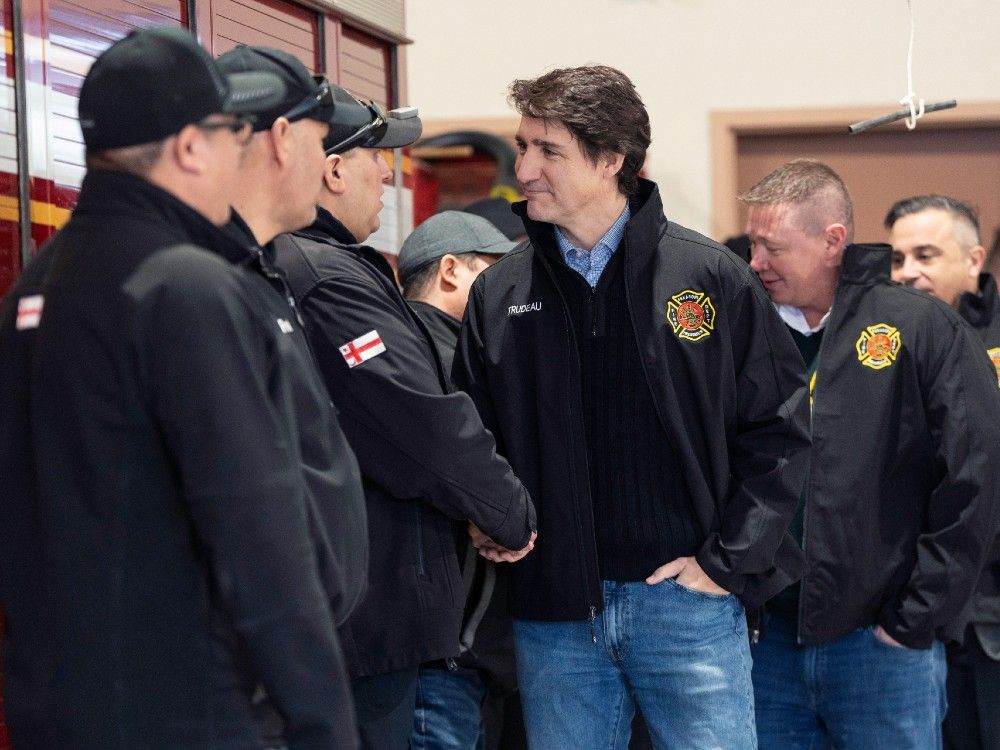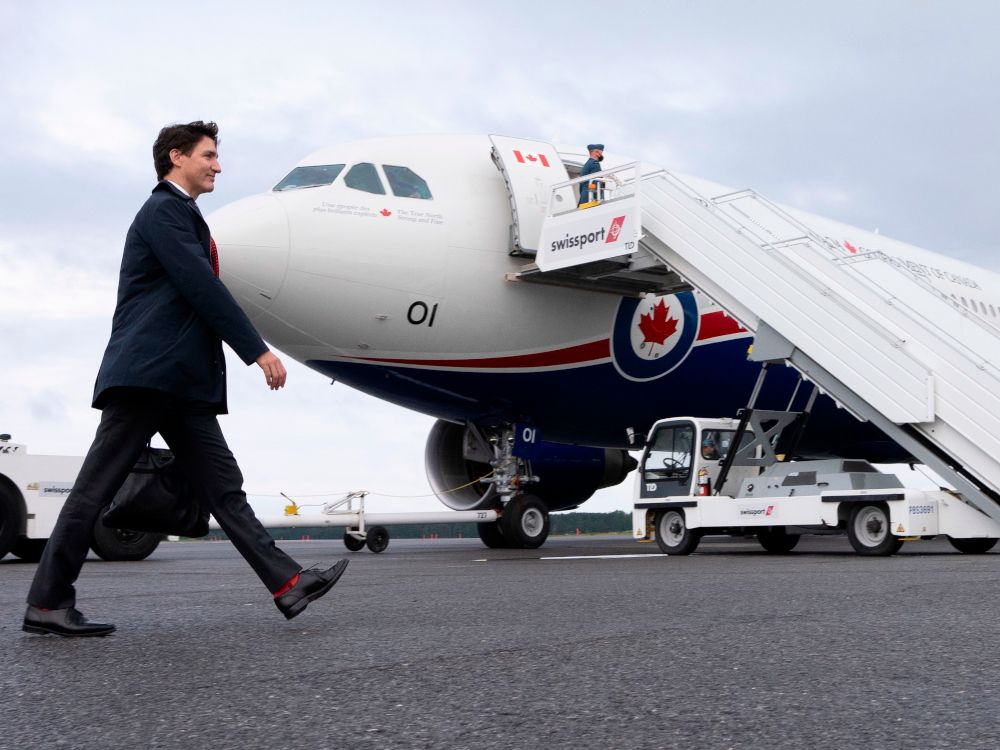Catherine Lévesque
Feb 22, 2024
Prime Minister Justin Trudeau told Albertans that right-wing politicians are misleading them on the carbon tax and net-zero targets, and that the transformation of the Canadian energy sector is “not a plot by Eastern bastards” to phase out oilsands.
On Ryan Jespersen’s Real Talk show on Wednesday, Trudeau was asked if he is committed to sticking with his government’s defining environmental policy, which Conservative Leader Pierre Poilievre has pledged would be scrapped if he forms government after the next election.
“Putting a price on pollution is a profoundly small-c conservative idea,” said Trudeau, who described it as a way of “letting market forces drive innovation instead of using the heavy hands of regulation” to put a price on pollution that is costing billions across the country.
Trudeau admitted that his government knew the carbon tax was “going to hit families across the country” financially, so instead of opting to reinvest the profits into clean energy — as Quebec has done with its system — the Liberals opted to instead to offer rebates.
The current system gives back quarterly rebates to people living in provinces under the federal regime based on their income, with lower-income households benefiting the most. People living in rural areas can also receive extra rebates.
Trudeau said that a family of four in Alberta can expect to receive $1,800 in the next year, or $450 quarterly, to compensate for the cost of the carbon tax.
The Parliamentary Budget Officer, however, concluded that this system would not be revenue-neutral for most households by 2030, as the government claims, once the carbon levy reaches $170 a tonne, but was criticized for not considering the costs of climate change.
The carbon tax has become so unpopular that two of the three declared candidates in the Alberta NDP leadership race have declared it is time to dump the consumer carbon tax.
Trudeau insisted that provinces and territories can come up with their own pricing scheme “as long as it’s equivalent to what everyone’s doing across the country.”
“If a new government in Alberta wants to change the way they put a price on pollution, (they can) knock themselves out,” he said about the NDP leadership contenders’ criticism.
“What matters is that we continue to send to industry a very clear signal that those who invest in innovative solutions, those who reduce their carbon emissions, will get an advantage and will not be penalized for having made investments that are … good for the economy of the future.”
Trudeau also urged Alberta to lead the way to achieve Canada’s net-zero targets with innovative solutions in the energy sector, such as hydrogen or carbon capture, utilization and storage.
“Canada can and should be the reliable provider of net-zero energy in a net-zero world by 2050. And if we’re going to be that (provider), we need Albertans to be thinking and working on that every single day,” he said.
During her recent visit to Ottawa, Alberta Premier Danielle Smith insisted on “the need for a new consensus between Alberta and Canada” and hoped that “all sides can get on the same page and move forward together,” while admitting it could happen “with time and patience.”
Trudeau used his interview with Jespersen in Edmonton to instead slam Smith’s government, which he accused of not talking “about the reality of climate change” and “putting the brakes on making sure there are good jobs for Albertans in the energy sector for decades to come.”
“If you can build a pipeline for oilsands oil, you can build a pipeline for hydrogen. If you can build the technology necessary for an oilsands refinery, you can build the technology necessary for hydrogens plant,” he said.
“Albertans will have great jobs in the future if the Alberta government gets out of its ideological opposition to doing things that are good for workers, good for the planet.”
At the same time, the world is still going to be needing Alberta oil, he said, citing the government’s acquisition of the Trans Mountain pipeline for which he said he took “a huge hit in the teeth” among his “eastern urban environmentalist voters.”
Trudeau endured a barrage of criticism in 2017, though, when he said Canada needs “to phase out” the oilsands at a town hall event in Ontario.
“The world is changing and it’s not a plot by eastern bastards,” added Trudeau, who did not specify if he is part of that group. “The world is looking at net-zero right now. Alberta can be part of that. But right-wing ideology is getting in the way of Alberta’s success right now.”
Jespersen said he could “already hear” Premier Smith and oil company CEO’s response to Trudeau’s rant and their surprise at the prime minister telling Albertans that “government ideology needs to get out of the way of innovation in the oilsands.”
“They feel that it’s you that’s been imposing Liberal ideology,” said Jespersen.

 nationalpost.com
nationalpost.com
Feb 22, 2024
Prime Minister Justin Trudeau told Albertans that right-wing politicians are misleading them on the carbon tax and net-zero targets, and that the transformation of the Canadian energy sector is “not a plot by Eastern bastards” to phase out oilsands.
On Ryan Jespersen’s Real Talk show on Wednesday, Trudeau was asked if he is committed to sticking with his government’s defining environmental policy, which Conservative Leader Pierre Poilievre has pledged would be scrapped if he forms government after the next election.
“Putting a price on pollution is a profoundly small-c conservative idea,” said Trudeau, who described it as a way of “letting market forces drive innovation instead of using the heavy hands of regulation” to put a price on pollution that is costing billions across the country.
Trudeau admitted that his government knew the carbon tax was “going to hit families across the country” financially, so instead of opting to reinvest the profits into clean energy — as Quebec has done with its system — the Liberals opted to instead to offer rebates.
The current system gives back quarterly rebates to people living in provinces under the federal regime based on their income, with lower-income households benefiting the most. People living in rural areas can also receive extra rebates.
Trudeau said that a family of four in Alberta can expect to receive $1,800 in the next year, or $450 quarterly, to compensate for the cost of the carbon tax.
The Parliamentary Budget Officer, however, concluded that this system would not be revenue-neutral for most households by 2030, as the government claims, once the carbon levy reaches $170 a tonne, but was criticized for not considering the costs of climate change.
The carbon tax has become so unpopular that two of the three declared candidates in the Alberta NDP leadership race have declared it is time to dump the consumer carbon tax.
Trudeau insisted that provinces and territories can come up with their own pricing scheme “as long as it’s equivalent to what everyone’s doing across the country.”
“If a new government in Alberta wants to change the way they put a price on pollution, (they can) knock themselves out,” he said about the NDP leadership contenders’ criticism.
“What matters is that we continue to send to industry a very clear signal that those who invest in innovative solutions, those who reduce their carbon emissions, will get an advantage and will not be penalized for having made investments that are … good for the economy of the future.”
Trudeau also urged Alberta to lead the way to achieve Canada’s net-zero targets with innovative solutions in the energy sector, such as hydrogen or carbon capture, utilization and storage.
“Canada can and should be the reliable provider of net-zero energy in a net-zero world by 2050. And if we’re going to be that (provider), we need Albertans to be thinking and working on that every single day,” he said.
During her recent visit to Ottawa, Alberta Premier Danielle Smith insisted on “the need for a new consensus between Alberta and Canada” and hoped that “all sides can get on the same page and move forward together,” while admitting it could happen “with time and patience.”
Trudeau used his interview with Jespersen in Edmonton to instead slam Smith’s government, which he accused of not talking “about the reality of climate change” and “putting the brakes on making sure there are good jobs for Albertans in the energy sector for decades to come.”
“If you can build a pipeline for oilsands oil, you can build a pipeline for hydrogen. If you can build the technology necessary for an oilsands refinery, you can build the technology necessary for hydrogens plant,” he said.
“Albertans will have great jobs in the future if the Alberta government gets out of its ideological opposition to doing things that are good for workers, good for the planet.”
At the same time, the world is still going to be needing Alberta oil, he said, citing the government’s acquisition of the Trans Mountain pipeline for which he said he took “a huge hit in the teeth” among his “eastern urban environmentalist voters.”
Trudeau endured a barrage of criticism in 2017, though, when he said Canada needs “to phase out” the oilsands at a town hall event in Ontario.
“The world is changing and it’s not a plot by eastern bastards,” added Trudeau, who did not specify if he is part of that group. “The world is looking at net-zero right now. Alberta can be part of that. But right-wing ideology is getting in the way of Alberta’s success right now.”
Jespersen said he could “already hear” Premier Smith and oil company CEO’s response to Trudeau’s rant and their surprise at the prime minister telling Albertans that “government ideology needs to get out of the way of innovation in the oilsands.”
“They feel that it’s you that’s been imposing Liberal ideology,” said Jespersen.

Trudeau says Albertans have been misled into opposing his 'conservative' carbon tax
The Prime Minister also said the transformation of the energy sector is "not a plot by Eastern bastards" to phase out oilsands.
Last edited:









